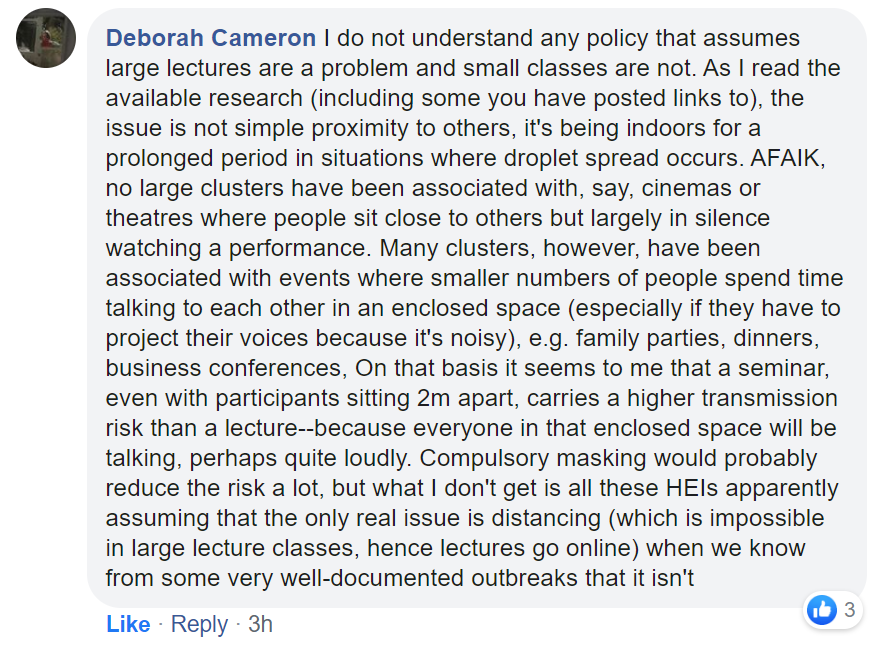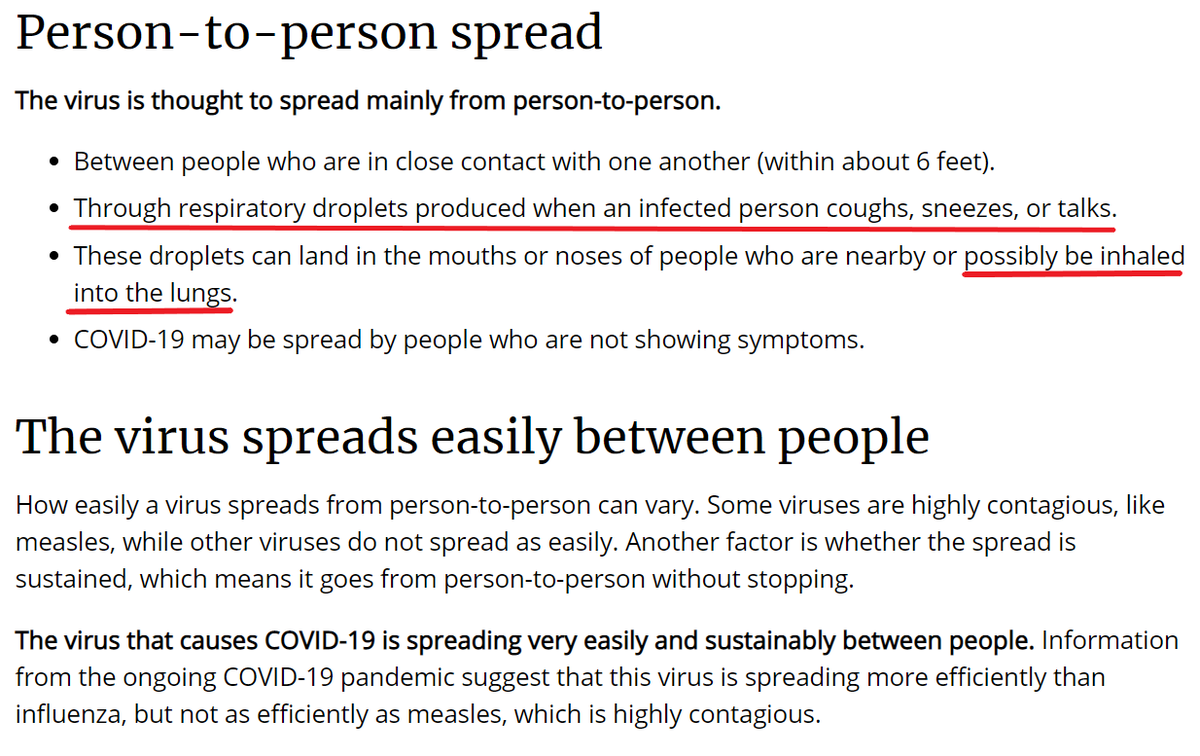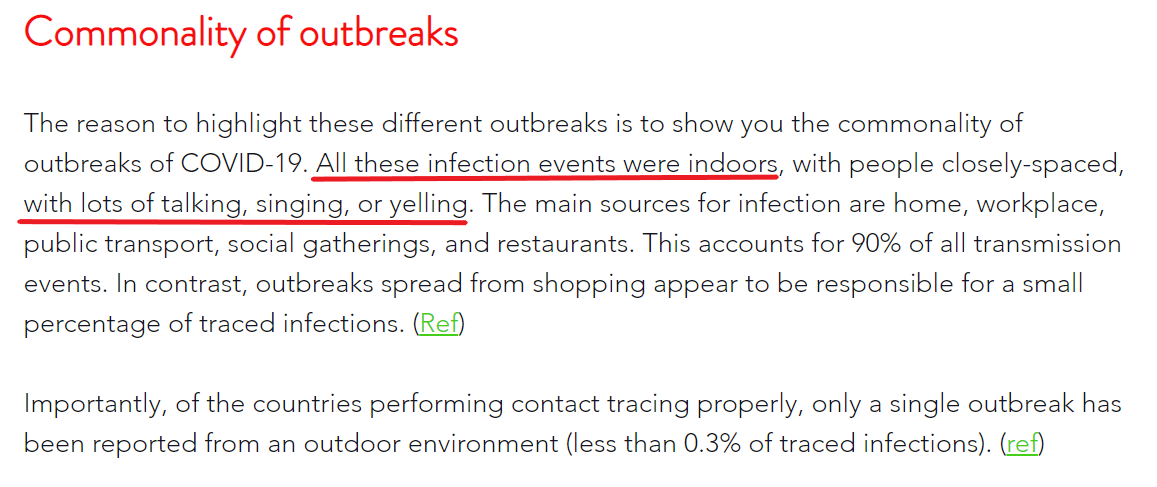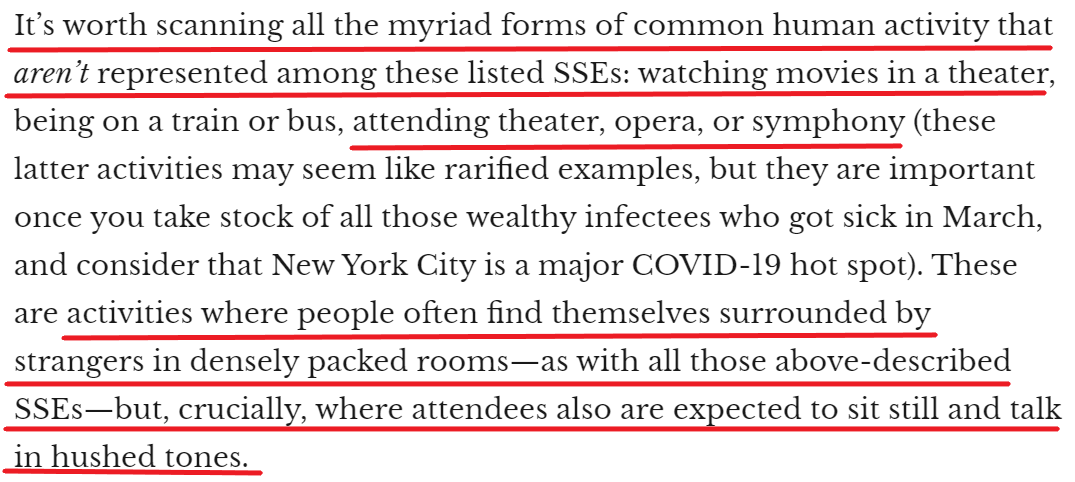. @UniofOxford prof Deborah Cameron notes https://abs.twimg.com/emoji/v2/... draggable="false" alt="👇" title="Down pointing backhand index" aria-label="Emoji: Down pointing backhand index">a key respect in which small group teaching is a greater Covid risk than large lectures, casting doubt on @Cambridge_Uni& #39;s moving large lectures online while keeping small group teaching in person. ( @AlistairJarvis @michelledonelan) 1/
https://abs.twimg.com/emoji/v2/... draggable="false" alt="👇" title="Down pointing backhand index" aria-label="Emoji: Down pointing backhand index">a key respect in which small group teaching is a greater Covid risk than large lectures, casting doubt on @Cambridge_Uni& #39;s moving large lectures online while keeping small group teaching in person. ( @AlistairJarvis @michelledonelan) 1/
I& #39;m devoting a single thread to her comments (originally posted on Facebook & reposted on Twitter with her permission), since I do not think their significance has yet fully registered with higher education, government & public health officials. 2/
To drive home their significance, I first draw attention to this https://abs.twimg.com/emoji/v2/... draggable="false" alt="👇" title="Down pointing backhand index" aria-label="Emoji: Down pointing backhand index">passage in (linked) US @CDCgov guidance for higher education:
https://abs.twimg.com/emoji/v2/... draggable="false" alt="👇" title="Down pointing backhand index" aria-label="Emoji: Down pointing backhand index">passage in (linked) US @CDCgov guidance for higher education:
"COVID-19 is mostly spread by respiratory droplets released when people TALK, cough, or sneeze" (my emphasis). 3/
https://www.cdc.gov/coronavirus/2019-ncov/community/colleges-universities/considerations.html">https://www.cdc.gov/coronavir...
"COVID-19 is mostly spread by respiratory droplets released when people TALK, cough, or sneeze" (my emphasis). 3/
https://www.cdc.gov/coronavirus/2019-ncov/community/colleges-universities/considerations.html">https://www.cdc.gov/coronavir...
On the CDC& #39;s (linked) "How COVID-19 Spreads" webpage, talking is also listed alongside coughing and sneezing, in the second of four bullet-pointed means by which the virus "mainly" spreads https://abs.twimg.com/emoji/v2/... draggable="false" alt="👇" title="Down pointing backhand index" aria-label="Emoji: Down pointing backhand index">. 4/
https://abs.twimg.com/emoji/v2/... draggable="false" alt="👇" title="Down pointing backhand index" aria-label="Emoji: Down pointing backhand index">. 4/
https://www.cdc.gov/coronavirus/2019-ncov/prevent-getting-sick/how-covid-spreads.html">https://www.cdc.gov/coronavir...
https://www.cdc.gov/coronavirus/2019-ncov/prevent-getting-sick/how-covid-spreads.html">https://www.cdc.gov/coronavir...
Why does the CDC group something as apparently innocuous as talking together with coughing & sneezing as a significant risk factor? 5/
Because of mounting evidence, via case studies (some w detailed CDC analysis), that talking (or singing) was the most likely means by which Covid-19 was spread from a single individual to many others indoors, more than 2 meters away, via inhalation into their lungs. 6/
See this linked analysis https://abs.twimg.com/emoji/v2/... draggable="false" alt="👇" title="Down pointing backhand index" aria-label="Emoji: Down pointing backhand index">of case studies by @Erinbromage, a Comparative Immunologist and Professor of Biology. 7/
https://abs.twimg.com/emoji/v2/... draggable="false" alt="👇" title="Down pointing backhand index" aria-label="Emoji: Down pointing backhand index">of case studies by @Erinbromage, a Comparative Immunologist and Professor of Biology. 7/
https://www.erinbromage.com/post/the-risks-know-them-avoid-them">https://www.erinbromage.com/post/the-...
https://www.erinbromage.com/post/the-risks-know-them-avoid-them">https://www.erinbromage.com/post/the-...
See also this survey of 58 case studies of "superspreader events" (SSE) by @jonkay, in which he draws attention to the dog that didn& #39;t bark https://abs.twimg.com/emoji/v2/... draggable="false" alt="👇" title="Down pointing backhand index" aria-label="Emoji: Down pointing backhand index">. 8/
https://abs.twimg.com/emoji/v2/... draggable="false" alt="👇" title="Down pointing backhand index" aria-label="Emoji: Down pointing backhand index">. 8/
https://quillette.com/2020/04/23/covid-19-superspreader-events-in-28-countries-critical-patterns-and-lessons/">https://quillette.com/2020/04/2...
https://quillette.com/2020/04/23/covid-19-superspreader-events-in-28-countries-critical-patterns-and-lessons/">https://quillette.com/2020/04/2...
In addition to noting this fact in 1/ https://abs.twimg.com/emoji/v2/... draggable="false" alt="👆" title="Up pointing backhand index" aria-label="Emoji: Up pointing backhand index">, Deborah Cameron also draws attention to the respects in which small, participatory group teaching shares the risk factors of various catalogued SSEs. 10/
https://abs.twimg.com/emoji/v2/... draggable="false" alt="👆" title="Up pointing backhand index" aria-label="Emoji: Up pointing backhand index">, Deborah Cameron also draws attention to the respects in which small, participatory group teaching shares the risk factors of various catalogued SSEs. 10/
Why, then, are universities such as @Cambridge_Uni moving apparently less risky events online (large lectures), & trying to keep the apparently more risky events in person (small group teaching)? 11/

 Read on Twitter
Read on Twitter a key respect in which small group teaching is a greater Covid risk than large lectures, casting doubt on @Cambridge_Uni& #39;s moving large lectures online while keeping small group teaching in person. ( @AlistairJarvis @michelledonelan) 1/" title=". @UniofOxford prof Deborah Cameron noteshttps://abs.twimg.com/emoji/v2/... draggable="false" alt="👇" title="Down pointing backhand index" aria-label="Emoji: Down pointing backhand index">a key respect in which small group teaching is a greater Covid risk than large lectures, casting doubt on @Cambridge_Uni& #39;s moving large lectures online while keeping small group teaching in person. ( @AlistairJarvis @michelledonelan) 1/" class="img-responsive" style="max-width:100%;"/>
a key respect in which small group teaching is a greater Covid risk than large lectures, casting doubt on @Cambridge_Uni& #39;s moving large lectures online while keeping small group teaching in person. ( @AlistairJarvis @michelledonelan) 1/" title=". @UniofOxford prof Deborah Cameron noteshttps://abs.twimg.com/emoji/v2/... draggable="false" alt="👇" title="Down pointing backhand index" aria-label="Emoji: Down pointing backhand index">a key respect in which small group teaching is a greater Covid risk than large lectures, casting doubt on @Cambridge_Uni& #39;s moving large lectures online while keeping small group teaching in person. ( @AlistairJarvis @michelledonelan) 1/" class="img-responsive" style="max-width:100%;"/>
 passage in (linked) US @CDCgov guidance for higher education:"COVID-19 is mostly spread by respiratory droplets released when people TALK, cough, or sneeze" (my emphasis). 3/ https://www.cdc.gov/coronavir..." title="To drive home their significance, I first draw attention to thishttps://abs.twimg.com/emoji/v2/... draggable="false" alt="👇" title="Down pointing backhand index" aria-label="Emoji: Down pointing backhand index">passage in (linked) US @CDCgov guidance for higher education:"COVID-19 is mostly spread by respiratory droplets released when people TALK, cough, or sneeze" (my emphasis). 3/ https://www.cdc.gov/coronavir..." class="img-responsive" style="max-width:100%;"/>
passage in (linked) US @CDCgov guidance for higher education:"COVID-19 is mostly spread by respiratory droplets released when people TALK, cough, or sneeze" (my emphasis). 3/ https://www.cdc.gov/coronavir..." title="To drive home their significance, I first draw attention to thishttps://abs.twimg.com/emoji/v2/... draggable="false" alt="👇" title="Down pointing backhand index" aria-label="Emoji: Down pointing backhand index">passage in (linked) US @CDCgov guidance for higher education:"COVID-19 is mostly spread by respiratory droplets released when people TALK, cough, or sneeze" (my emphasis). 3/ https://www.cdc.gov/coronavir..." class="img-responsive" style="max-width:100%;"/>
 . 4/ https://www.cdc.gov/coronavir..." title="On the CDC& #39;s (linked) "How COVID-19 Spreads" webpage, talking is also listed alongside coughing and sneezing, in the second of four bullet-pointed means by which the virus "mainly" spreadshttps://abs.twimg.com/emoji/v2/... draggable="false" alt="👇" title="Down pointing backhand index" aria-label="Emoji: Down pointing backhand index">. 4/ https://www.cdc.gov/coronavir..." class="img-responsive" style="max-width:100%;"/>
. 4/ https://www.cdc.gov/coronavir..." title="On the CDC& #39;s (linked) "How COVID-19 Spreads" webpage, talking is also listed alongside coughing and sneezing, in the second of four bullet-pointed means by which the virus "mainly" spreadshttps://abs.twimg.com/emoji/v2/... draggable="false" alt="👇" title="Down pointing backhand index" aria-label="Emoji: Down pointing backhand index">. 4/ https://www.cdc.gov/coronavir..." class="img-responsive" style="max-width:100%;"/>
 of case studies by @Erinbromage, a Comparative Immunologist and Professor of Biology. 7/ https://www.erinbromage.com/post/the-..." title="See this linked analysishttps://abs.twimg.com/emoji/v2/... draggable="false" alt="👇" title="Down pointing backhand index" aria-label="Emoji: Down pointing backhand index">of case studies by @Erinbromage, a Comparative Immunologist and Professor of Biology. 7/ https://www.erinbromage.com/post/the-..." class="img-responsive" style="max-width:100%;"/>
of case studies by @Erinbromage, a Comparative Immunologist and Professor of Biology. 7/ https://www.erinbromage.com/post/the-..." title="See this linked analysishttps://abs.twimg.com/emoji/v2/... draggable="false" alt="👇" title="Down pointing backhand index" aria-label="Emoji: Down pointing backhand index">of case studies by @Erinbromage, a Comparative Immunologist and Professor of Biology. 7/ https://www.erinbromage.com/post/the-..." class="img-responsive" style="max-width:100%;"/>
 . 8/ https://quillette.com/2020/04/2..." title="See also this survey of 58 case studies of "superspreader events" (SSE) by @jonkay, in which he draws attention to the dog that didn& #39;t barkhttps://abs.twimg.com/emoji/v2/... draggable="false" alt="👇" title="Down pointing backhand index" aria-label="Emoji: Down pointing backhand index">. 8/ https://quillette.com/2020/04/2..." class="img-responsive" style="max-width:100%;"/>
. 8/ https://quillette.com/2020/04/2..." title="See also this survey of 58 case studies of "superspreader events" (SSE) by @jonkay, in which he draws attention to the dog that didn& #39;t barkhttps://abs.twimg.com/emoji/v2/... draggable="false" alt="👇" title="Down pointing backhand index" aria-label="Emoji: Down pointing backhand index">. 8/ https://quillette.com/2020/04/2..." class="img-responsive" style="max-width:100%;"/>


